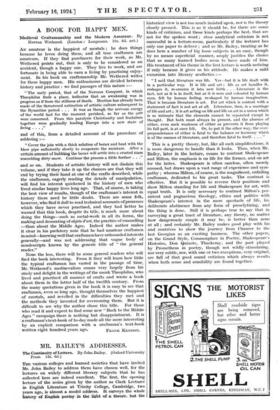A BOOK FOR HAPPY MEN.
Medieval Craftsmanship and the Modern Amateur. By Newton Wethered. (London : Longmans. 10s. 6d. net.) AN amateur is the happiest of mortals ; he does things because he loves doing them, and all true craftsmen are amateurs. If they find purchasers for their work, as Mr. Wethered points out, that is only to be considered as an accident, though a happy one. They live to work, and are fortunate in being able to earn a living by practising enjoy- ment. In his book on craftsmanship Mr. Wethered writes for these happy men. His enthusiasms are divided between history and practice : we find passages of this nature :— "The early period, that of the Norman Conquest, in which Theophilus finds a place, indicates that an awakening was in progress as if from the stillness of death. Mention has already been made of the threatened extinction of artistic culture subsequent to the Byzantine period. . . It was as though the nervous energy of the world had for the moment perished, so far as the arts were concerned. From this paralysis Christianity and feudalism together were gradually leading Europe into a new state of living...,"
and of this, from a detailed account of the procedure of soldering :—
"Cover the join with a thick solution of borax and heat with the blow pipe sufficiently slowly to evaporate the moisture. After a • certain amount of bubbling the borax will settle into a crusted mass 'resembling dirty snow. Continue the process -a little further. . ."
and so on. Students of artistic history will not disdain this volume, and if they take it up the chances are that they will end by trying their hand at one of the crafts described, while the craftsman, eagerly reading the details of manipulation, will find his interest quickened in the history of men who lived similar happy lives long ago. That, of course, is taking the best view of results, though of the craftsman's interest in history there need be little doubt. There are some folk, however, who finclit dull to read technical accounts of processes which they have never practised, and they had better be warned that this book, despite its title, is much more about doing the things—such as metal-work in all its forms, the making and decorating of objets d'art, the practice of enamelling —than about the Middle Ages. Indeed the author makes
• it clear in his prefatory note that he had amateur craftsmen in mind—knowing well that craftsmen have unbounded interests generally—and was not addressing that vague body of nondescripts known by the generic title of "the general reader."
None the less, there will be some general readers who will find the book interesting. From it they will learn how little the typical craftsman has varied in the passage of time, Mr. Wethered's mediaevalism comes very largely from his study and delight in the writings of the monk Theophilus, who lived and practised all manner of crafts and wrote a book about them in the latter half of the twelfth century. From the many quotations given in the book it is easy to see that craftsmen, even so long ago, thought themselves the happiest of mortals, and revelled in the difficulties they met and - the methods they invented for overcoming them. But it is difficult to see why the author chose this title. For those who read it and expect to find some new "Back to the Middle Ages" campaign there is nothing but disappointment. It is a craftsman's text-book of to-day made all the more interesting by an explicit comparison with a craftsman's text-book
written eight hundred years ago. FRANK KENDON.










































 Previous page
Previous page